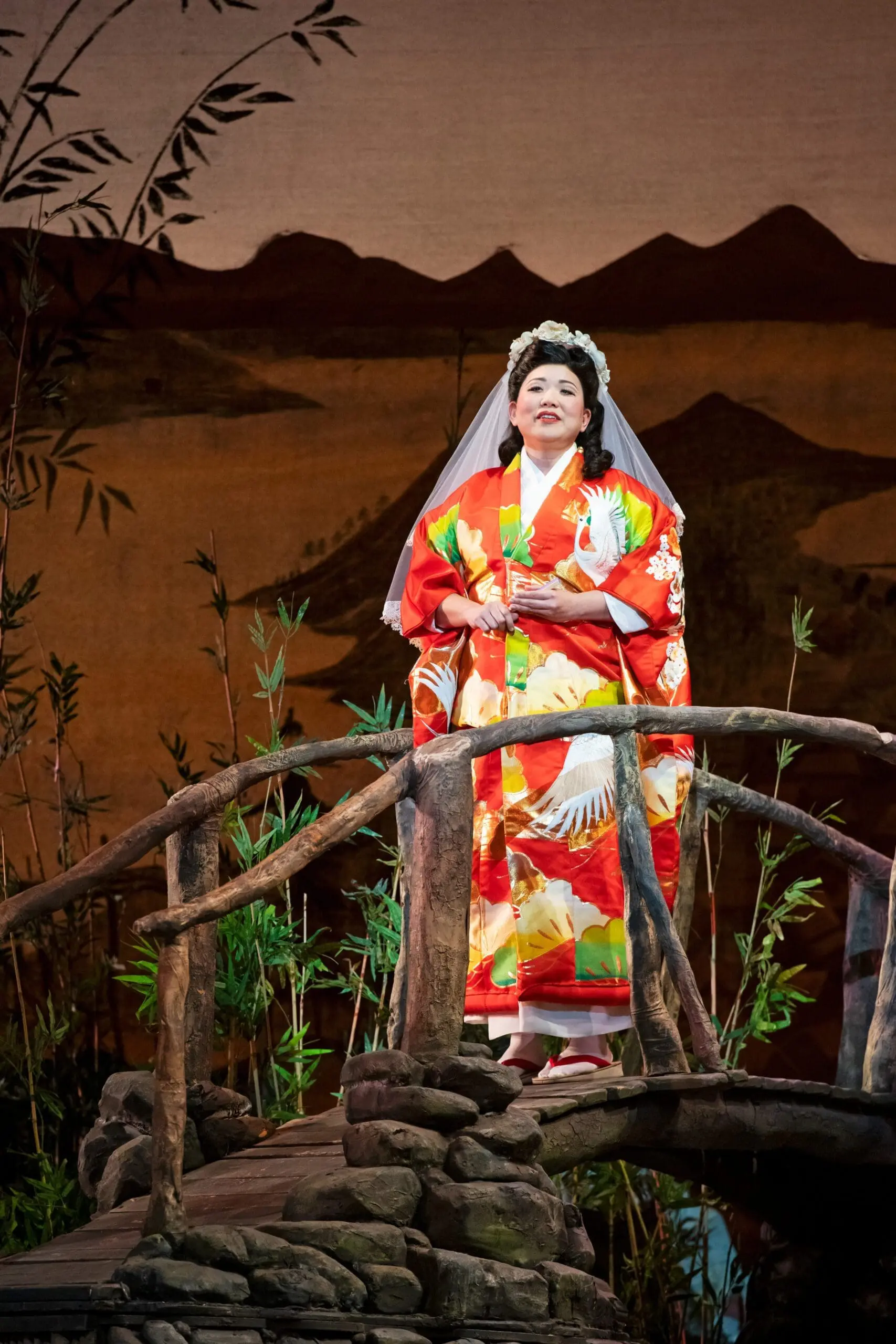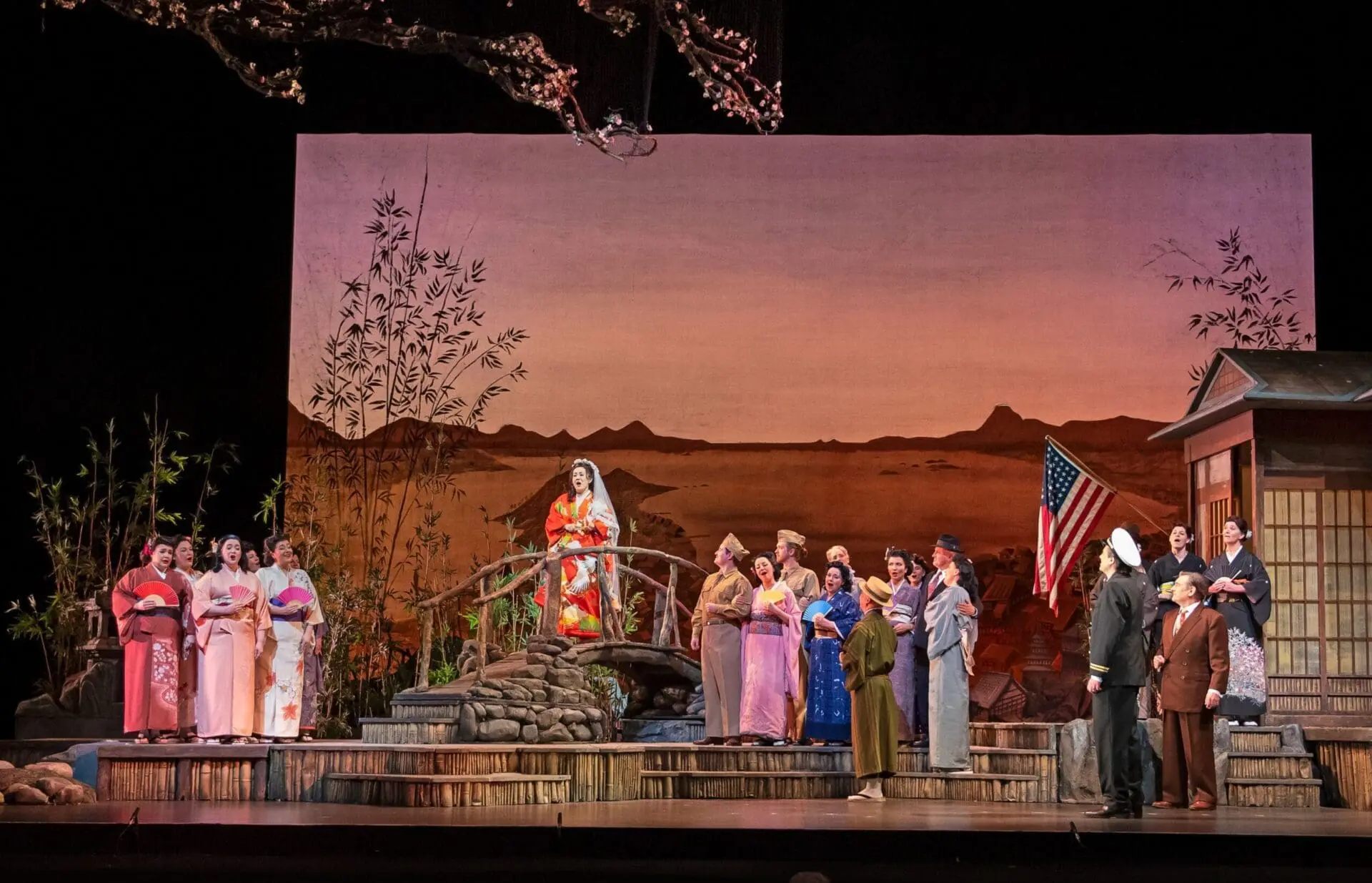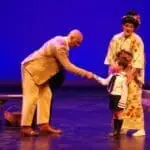Thanks to new Trumpian realities and a uniformly excellent cast, Vancouver Opera’s season closer Madama Butterfly is a hyper-relevant must see.
What can you say about the timeliness of an opera that explores the dark side of American imperial adventures (with “The Star-Spangled Banner” as a leitmotif) that opened a few days before our national election? Well, just like a Vancouver Canucks game, it began with a rousing rendition of “O Canada.”
And yet all’s fair in love and opera, and beyond the setting in post-war occupied Japan when thousands of women were abandoned by US servicemen, there’s a strong American element in this compelling production. The lush set is on loan from Portland, and the director Mo Zhou is a Chinese American known for fresh interpretations of classic works who makes her Vancouver Opera debut with this production. Opening-night Pinkerton Robert Watson (April 26, May 1, May 3), who is also making his Vancouver Opera debut, is an American tenor.
Overall though, this may also be one of Vancouver Opera’s most international productions to date. The role of Cio-Cio-San (Madama Butterfly) is performed by two exceptional sopranos: Tokyo-born Yasko Sato (April 26, May 1, May 3) is making her Vancouver Opera and Canadian debut in this production. She shares the roles with Taiwanese Karen Chia-Ling Ho (April 27, May 4).
Canadian tenor Adam Luther (April 27, May 4) alternates with Watson as Pinkerton. Additional principal cast members include Japanese mezzo-soprano Nozomi Kato making her Vancouver Opera debut as Suzuki, Canadian baritone Brett Polegato (Don Giovanni, Eugene Onegin) as Sharpless, Korean-American tenor Julius Ahn (Turandot) as Goro, Korean bass Insung Sim making his Vancouver Opera debut as The Bonze, Canadian baritone Luka Kawabata (Carmen, A Midsummer Night’s Dream) as Prince Yamadori and Canadian soprano Heidi Duncan (Die Fledermaus, Carmen) as Kate Pinkerton.
This diverse casting underscores Vancouver Opera’s “commitment to presenting authentic and culturally resonant performances.” In a pre-show talk, Kawabata said it was the “most culturally appropriate casting” he had ever experienced. The principals were joined by members of the Vancouver Opera Chorus and the Vancouver Opera Orchestra, all in fine form.

Photo Credit: Emily Cooper Photography
Nozomi Kato as Suzuki, Yasko Sato as Cio-Cio-San and Myles Hunter-Gibbs as Sorrow waiting for the return of Pinkerton
There are timely political analogies here. As I always say, the only thing worse than being an enemy of the Americans is being a former ally (just ask Saddam Hussein or the Shah of Iran, and by the way I am now reimagining a Butterfly in post invasion Baghdad). And in many ways when it comes to American hegemony, we’re all Madama Butterfly now.
Zhou is conscious of the fetishization of Asian women that still persists in the West. When she first arrived in America, she told us in a pre-show talk, an old man catcalled her saying “Hey Cio-Cio-San.” It’s a credit to her direction that, beyond current political theatre and politically correct casting, the opera stands on its own and even manages to transcend Puccini’s sumptuous, if problematic, Orientalism to present a powerful human drama.
What’s not to love about this stellar production, bathed in a cherry blossom glow thanks to lighting designer Marie Yokoyama, that belies Butterfly’s tragic end. Just like Butterfly herself, of whom Pinkerton sings, “She moves like a blown glass,” the entire opera was imbued with a dreamy quality that waxed lyrical, poignant and gorgeous. Under the baton of maestro Jacques Lacombe, the orchestra was of a piece and expressed musically all the luxuriance and nuance of the score.
From the first scene, when Pinkerton sang “Everywhere in the world, the roving Yankee takes his pleasure and his profit, indifferent to all risks. He drops anchor at random…” to knowing guffaws from the packed theatre, through to the final, horrible consequence of his cavalier actions when Butterly commits her ritualized suicide, the performances and pacing were captivating.
Watson’s performance on opening night showed both flawless technique and an impressive vocal range, as well as an emotional depth that saw Pinkerton go from hapless devil-may-care insouciance to real regret and inner turmoil when he realizes the damage that he has done to Butterfly. For her part, Yasko Sato simply personified Butterly, embodying both her fragility and courage. Her strong yet subtle soprano, imbued with delicate coloratura flourishes, was sheer delight. The two together offered genuine chemistry and achingly expressed pathos.
The supporting roles were also well played. Insung Sim’s Bonze offered impressive gravitas to Pinkerton’s casual American superficiality, Luka Kawabata as Yamadori was convincing in his portrayal of a man dealing with the pain of unrequited love, and Julius Ahn lent Goro both pragmatism and comic relief.
Special mention goes to Brett Polegato as Sharpless, the American consul in Nagasaki, who played his role with just the right amount of concern at Butterfly’s plight and frustration with her stubborn and deluded belief in Pinkerton’s love, and to the young Myles Hunter-Gibbs who played Butterfly’s son Sorrow with acting chops beyond his years. The exceptional Nozomi Kato (Suzuki) expressed such dedication to and care for the delicate Butterfly that I left the theatre with the sense that theirs was the true love story in the opera.

Photo Credit: Emily Cooper Photography
Karen Chia-ling Ho in the title role of Madama Butterfly at Vancouver Opera
Opera Canada depends on the generous contributions of its supporters to bring readers outstanding, in-depth coverage of opera in Canada and beyond. Please consider subscribing or donating today.















